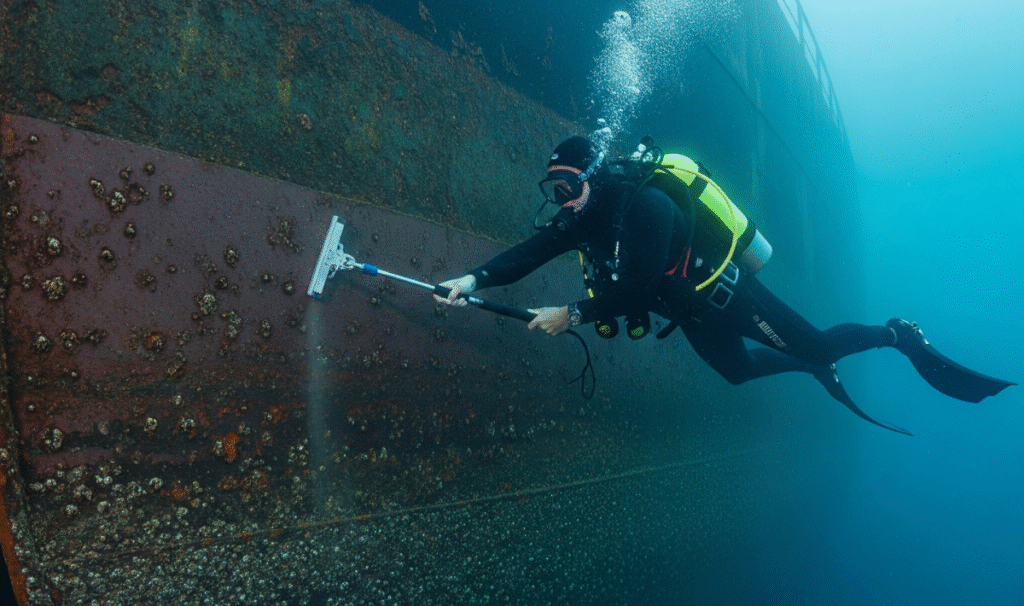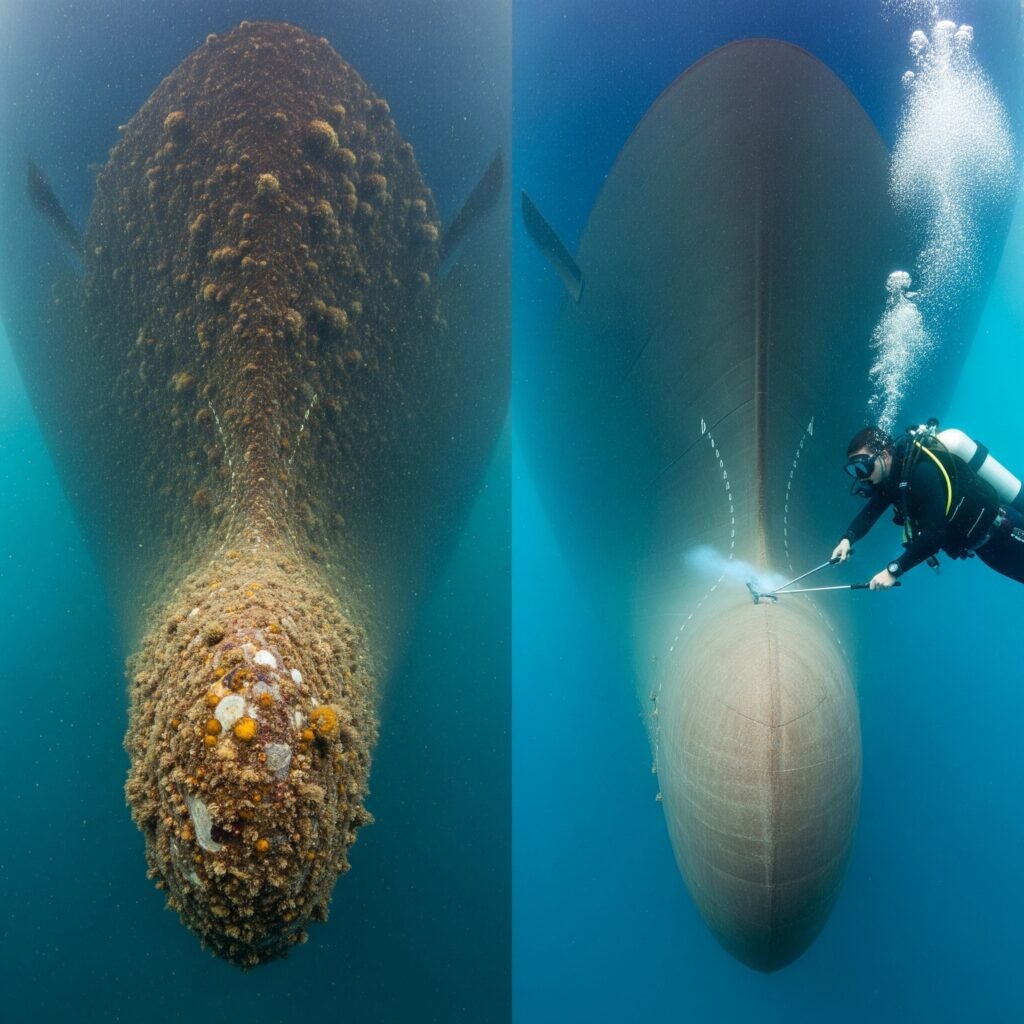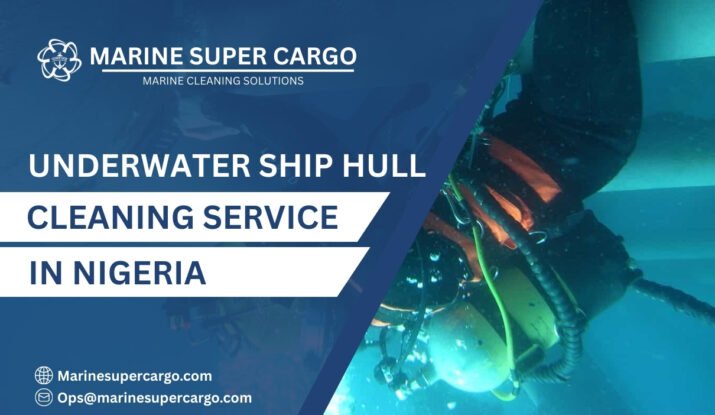When most people think about Nigeria, they picture bustling cities, oil-rich industries, or cultural vibrance. But beyond the noise of Lagos or Port Harcourt, another story is unfolding on the coastlines: Nigeria as a maritime hub of West Africa.
Ships entering and leaving Nigerian waters face a challenge shared by vessels worldwide—biofouling. Over time, marine organisms like barnacles, algae, and mussels latch onto hulls, slowing ships down and increasing operational costs. Here, underwater ship hull cleaning in Nigeria offers a solution that’s as practical as it is essential.
This isn’t just about scrubbing barnacles; it’s about saving money, protecting vessels, and caring for the environment. Let’s unpack the underwater ship hull cleaning in Nigeria and why it matters now more than ever.
What is Underwater Ship Hull Cleaning?
Think of a ship’s hull as a swimmer’s suit. Smooth and sleek, it allows for gliding effortlessly through water. Now imagine that suit covered with sticky seaweed, grit, and barnacles—it would drag you down with every stroke. That’s exactly what biofouling does to massive ocean-going ships.
Hull cleaning is the process of removing this growth. Skilled divers or robotic equipment use high-powered brushes, cavitation jets, or suction systems to clean below the waterline. In Nigeria, this service is becoming increasingly valuable as the country grows its maritime infrastructure and global trade volume.
The Problem of Biofouling and Drag
Biofouling acts like rust on a bicycle chain—it doesn’t stop you, but it makes every rotation harder. For ships, this drag means fuel-hungry engines working overtime just to move at standard speeds. Research suggests biofouling can raise fuel consumption by up to 40%.

How Clean Hulls Improve Performance
Here’s where underwater ship hull cleaning in Nigeria becomes a game-changer. A clean hull slices through water with minimal resistance, reducing the strain on engines. This translates to significant fuel savings, faster voyages, and reduced operational costs.
For shipowners and operators in Nigeria, every cleaning isn’t just maintenance—it’s an investment with returns that can be measured in thousands of dollars saved per voyage.
Corrosion Control and Structural Protection
Marine life attached to hulls traps moisture and accelerates corrosion. Left unchecked, this can strip away protective coatings, weaken steel, and shorten a ship’s lifespan.
Routine underwater ship hull cleaning in Nigeria removes biofouling before it causes structural damage. In essence, it’s preventive healthcare for vessels, ensuring they last longer and operate more safely.
Why Compliance is Crucial for Nigerian Ports
The global shipping industry is tightly regulated. The International Maritime Organization (IMO) requires ships to meet specific conditions to operate internationally. Heavily fouled hulls run the risk of failing inspections in Nigerian ports, leading to fines, detentions, or delays.
Regular cleaning keeps operators compliant, reducing risks and improving overall safety standards.
Reducing Carbon Footprints
Fuel efficiency and environmental responsibility are now inseparable. According to imo.org, shipping accounts for nearly 3% of global carbon emissions. Clean hulls directly cut down on fuel usage, which reduces emissions.
By prioritizing underwater ship hull cleaning in Nigeria, operators not only protect their bottom line but also contribute to global climate and sustainability goals.
Preventing Invasive Species in Nigerian Waters
Marine organisms can travel vast distances attached to ship hulls, becoming invasive species in new ecosystems. This creates ecological imbalances in local waters. The MARPOL Convention highlights the dangers of these transfers.
Routine hull cleaning prevents invasive species from entering Nigeria’s marine environment, protecting biodiversity along the Gulf of Guinea.
Why Nigeria is a Strong Location for Hull Cleaning Services
Nigeria’s Geographical Advantage in West Africa
Nigeria’s ports, especially Lagos and Port Harcourt, are gateways to West and Central Africa. These busy routes make underwater ship hull cleaning in Nigeria a strategically smart choice for vessels stopping in the region.
Local Talent and Expanding Infrastructure
Following international best practices referenced at imca-int.com and iaphworldports.org, Nigeria’s workforce is gaining expertise in marine services. With investments in maritime facilities, the nation is increasingly capable of supporting demanding ship maintenance needs.
How Underwater Hull Cleaning is Performed
Step-by-Step Process
- Initial Inspection – Divers or drones examine the hull for fouling.
- Biofouling Removal – Specialized brushes or cavitation jets clean hull surfaces.
- Polishing – Smoother finishes ensure minimal drag.
- Debris Capture – Eco-friendly disposal prevents marine pollution.
- Post-Clean Review – Checks verify coating integrity and compliance.
Tools and Tech Used in Nigeria
From divers using hydraulic brushes to remotely operated vehicles (ROVs), underwater ship hull cleaning in Nigeria combines manual expertise with modern technology. Eco-conscious practices prevent damage to ecosystems, aligning with sustainability goals.
Cost vs. Frequency Balance
Cleaning too aggressively risks stripping protective coatings, while waiting too long raises costs through added fuel consumption. The balance? Most experts recommend underwater ship hull cleaning in Nigeria every 6–12 months, depending on vessel activity and fouling rates.
Environmental and Weather Conditions
Nigeria’s warm, nutrient-rich waters are prone to heavy marine growth, especially in port areas. This makes hull cleaning a must for vessels to sustain efficiency while avoiding environmental risks.

The Future of Underwater Ship Hull Cleaning in Nigeria
Eco-Friendly Innovations
New technologies like biocide-free antifouling paints are changing the industry. In Nigeria, as sustainability goals rise, ships will increasingly adopt eco-compliant coatings combined with specialized underwater cleaning methods.
Adoption of Robotics and AI Monitoring
The future of underwater ship hull cleaning in Nigeria may lie in smart robotics. Imagine drones scanning hulls in real-time, flagging fouling levels, and even cleaning automatically. Such predictive maintenance will slash unnecessary costs and improve turnaround times.
Conclusion
A ship’s hull is like its lungs—when clogged, the entire system struggles. Keep it clean, and efficiency rises, safety improves, and the planet benefits. The three key benefits of underwater ship hull cleaning in Nigeria are undeniable:
- Greater fuel savings and operational efficiency.
- Longer-lasting, safer vessels with full regulatory compliance.
- A cleaner marine environment with reduced emissions and fewer invasive species.
With Nigeria’s expanding maritime sector and strategic location, hull cleaning is both practical and profitable. By partnering with experts like CleanShip.co, shipowners invest in smarter, sustainable, and future-ready operations.
FAQ:
Q1. How often should ships schedule hull cleaning in Nigeria?
Typically, every 6–12 months, though high-traffic or idle vessels may require more frequent checks.
Q2. Is hull cleaning safe for ship coatings?
Yes—when done by professionals with modern tools, protective coatings remain intact while biofouling is removed.
Q3. Does hull cleaning really improve safety?
Absolutely. It prevents corrosion, reduces inspection risks, and preserves vessel strength.
Q4. Why choose Nigeria for hull cleaning?
Its ports are strategically located, its workforce is skilled, and services follow international best practices.
Q5. Can hull cleaning reduce shipping’s carbon footprint?
Yes. By cutting drag and fuel use, underwater ship hull cleaning in Nigeria lowers CO₂ emissions significantly.


